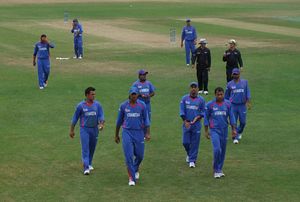After Afghanistan registered its first-ever victory in the Cricket World Cup last week, defeating Scotland in a nail biter, the usually tepid streets of Kabul erupted with joy. Traffic came to a standstill as revelers spilled into the street to celebrate the victory.
Afghans seldom have much to celebrate when it comes to national issues. With the economy in bad shape and politics in flux, the Afghanistan’s victory brought smiles to scores of faces all over the country.
Masood, a 24-year-old banker who lives in Kabul, took in the match at his house in the company of several friends. “The victory made us proud,” he said. “It shows us that Afghans can excel in any walk of life. Cricketers are our new heroes, we need more people like them to raise Afghanistan’s profile on the world stage.”
Young Afghans yearn for new national heroes. The generation that has grown up after Taliban rule want to forge a new narrative for Afghanistan, based on renewed ambition and imagination. They are more open minded and exposed to the world outside than their predecessors.
“The era of war heros and warlords are gone,” Masood says. “Afghanistan has been identified with the names of politicians for too long. Old heros no longer fire our imagination.” Masood hopes to eventually attend business school in the United States.
Masood’s new hero is Shapoor Zadran, the fastest bowler on the Afghan cricket team. Zardan is the Afghan team’s top wicket-taker so far in the tournament. He’s also one of the fastest bowlers in the World Cup. The banker’s wall is adorned with a life size picture of his idol.
“Cricket unites Afghans,” Habib Khan Totakhil, a Kabul-based journalist explains. “It brings people together. Sportsmen are redefining the sense of nationalism in Afghanistan. They bring smiles to people’s faces.”
Totakhil sees the World Cup as part of a changing of the guard for young Afghans. “The next generation wants new heroes and idols to emerge. The cricketers and footballers of Afghanistan present a new image of the nation to the world. They are the icons of the nation.”
Young Afghans are weary of war. They don’t want to live under the threat of internal displacement, as did many of their families when civil war erupted in the 1990s.
“I was born in Iran and came to Afghanistan in 2002, at the age of 15,” recalls Abbas Naderi, who hopes to rebuild the tourism industry in the province of Bamiyan, in Central Afghanistan, where Taliban forces dynamited ancient Buddha statues fourteen years ago in an incident that drew international condemnation. “I don’t want to go back to [Iran] as refugee. I want to ensure a better future for Afghanistan. I want to hone my skill in this country and do something meaningful,” Naderi has a bitter experiences from living as a “second class citizen” in Iran where “most of the Afghan refugees are treated as outcasts.”
“Watching the Afghans defeat Scotland in World Cup filled me with pride,” Naderi remembers. “I cried with joy. For a long time, Afghans have lived in the shadow of violence and international suppression. It’s time we assert ourselves and show our new face to the world.”
But cricketers, like Zadran and Mohammad Nabi, aren’t the only heroes who have emerged in the war torn country over the past fourteen years. Ali Shah and Mohammad Shahzad are Afghanistan’s first skiing champions. In a recent skiing competition in Bamiyan, Shah and Shahzad competed against fourteen internationals and came on top. Athletes like these men increasingly captivate the imagination of young Afghans, not the warlords who fought off the Soviets and other foreign invaders.
“It looks odd to be a skiing champion in Afghanistan,” Shah said after prevailing in a recent competition. “But it’s a new reality. Nobody can believe that an Afghan came on top in a skiing championship. We want to prove that Afghanistan is not defined by the struggle against the Taliban and terrorism. We want to show that the Taliban is an aberration, not a lasting reality.”
There is a sense of restlessness among Afghans for a new narrative. Younger generations do not want to identify themselves with legendary warlords like Ahmad Shah Massoud, Mullah Dadullah, Abdul Rashid Dostum, and Mohammad Qasim Fahim. They hope to cultivate icons from sports and other professions.
“The time for idolizing war heroes in Afghanistan is over,” Masood says. “We need heroes like Zadran who defy limits and carve a name for themselves and the country in the international community.”
Afghanistan is on the cusp of a change. The new generation yearns for a new narrative, a new awakening. Zadran, Ali Shah and Shahzad are the reflections of their subconsciousness. They are the byproducts of an emerging peace in Afghanistan.

































